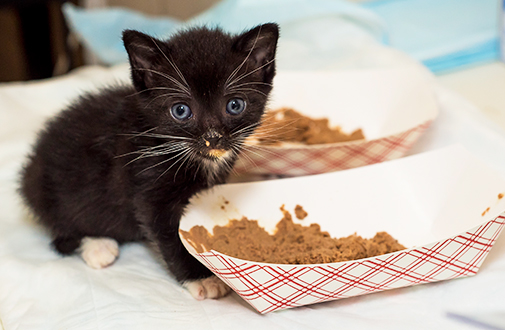Bringing home a kitten is an exciting and heartwarming experience. However, with the joy of a new furry friend comes the responsibility of ensuring that they grow up healthy and strong. One of the most crucial aspects of a kitten’s well-being is their nutrition. Like all animals, kittens have specific dietary needs that are essential to their development. A proper diet during their early months lays the foundation for a healthy adult life. In this blog, we’ll explore what kittens need in terms of nutrition and how you can make sure your cat gets the best start in life.
Understanding the Nutritional Needs of Kittens
Kittens require a well-balanced diet rich in essential nutrients to support their rapid growth. During the first few months, their muscles, bones, and organs are developing at a fast pace. A kitten’s diet needs to provide adequate energy, protein, fats, vitamins, and minerals to meet their growing body’s needs. The nutritional requirements of kittens are quite different from those of adult cats, so it’s important to provide them with specially formulated food.
The Role of Mother’s Milk in Early Nutrition
In the first few weeks of life, kittens rely entirely on their mother’s milk for sustenance. Mother’s milk provides all the necessary nutrients, antibodies, and hydration that a kitten needs during this crucial phase. Colostrum, the first milk produced by the mother, is packed with antibodies that help boost the kitten’s immune system. It’s recommended that kittens remain with their mother for at least 8 weeks to get the full benefits of this nutrient-rich milk.
Transitioning to Solid Food
Around 4-6 weeks, kittens will begin to transition from milk to solid food. This process is called weaning. It’s important to introduce soft, easily digestible food during this time. Wet kitten food or softened dry food can be offered to ease this transition. Mix a little water or kitten formula with the food to create a mushy texture that’s easy for them to eat. Gradually reduce the amount of liquid as they grow accustomed to eating solid food.
Importance of High-Quality Kitten Food
Not all kitten foods are created equal. It’s essential to choose a high-quality, specially formulated kitten food that meets the nutritional needs of growing cats. Look for food that lists animal protein (such as chicken, fish, or lamb) as the first ingredient. Avoid foods with excessive fillers, artificial colors, and preservatives. High-quality kitten food should contain the right balance of protein, fat, vitamins, and minerals to support healthy growth.
Protein: The Building Block of Growth
Protein is one of the most important nutrients for kittens. It supports muscle development, tissue repair, and overall growth. Kittens need a higher protein intake than adult cats, as their bodies are constantly building new tissues. Animal-based proteins, such as chicken, turkey, or fish, are ideal sources of protein for kittens. Look for foods that contain at least 30% protein to meet your kitten’s needs.
Fats for Energy and Brain Development
Fats provide kittens with the energy they need to explore, play, and grow. They also play a key role in brain development and overall organ function. Omega-3 and Omega-6 fatty acids are particularly important for a kitten’s cognitive development, vision, and skin health. Foods that contain sources of healthy fats, like fish oil or chicken fat, will give your kitten the energy and nutrients they need.
Carbohydrates: Limited but Necessary
While cats are obligate carnivores, meaning their diet should be primarily animal-based, kittens can still benefit from some carbohydrates. Carbs provide an easily digestible source of energy and are often found in grains, vegetables, or legumes in kitten food. However, carbohydrates should be limited, as too much can lead to unnecessary weight gain. Look for foods that include complex carbs like rice or sweet potatoes.
Essential Vitamins and Minerals
Vitamins and minerals are critical for your kitten’s overall health and development. Vitamin A supports vision, Vitamin D helps with bone growth, and Vitamin E is essential for a healthy immune system. Minerals like calcium and phosphorus play an important role in bone and dental development. Make sure the kitten food you choose is enriched with these essential vitamins and minerals.
Hydration is Key
Kittens need plenty of water to stay hydrated, as dehydration can lead to serious health problems. Always ensure that your kitten has access to fresh, clean water. If your kitten prefers wet food, they will also be getting additional hydration from their meals. Wet kitten food can be particularly beneficial for kittens who are not drinking enough water on their own.
Avoiding Toxic Foods
There are some human foods and ingredients that are toxic to kittens and cats. Foods like chocolate, onions, garlic, alcohol, and certain artificial sweeteners (such as xylitol) can cause serious health problems for kittens. It’s important to keep these out of their reach and ensure that your kitten’s food does not contain any harmful ingredients.
Frequency of Feeding
Kittens have small stomachs and need to eat more frequently than adult cats. It’s recommended to feed kittens 3-4 small meals a day until they are about 6 months old. As they grow, the number of feedings can be reduced to twice a day. Monitor your kitten’s weight and growth to ensure they are getting enough food without overfeeding.
Consulting a Veterinarian
Your veterinarian is an excellent resource for determining your kitten’s specific nutritional needs. Regular check-ups will ensure your kitten is growing properly and receiving the right nutrients. Your vet can recommend the best food options and feeding schedules tailored to your kitten’s unique needs.
Conclusion
Providing the right nutrition is one of the most important aspects of raising a healthy kitten. From the weaning stage to their first year, a balanced diet rich in essential nutrients is crucial to supporting your kitten’s growth and development. By choosing high-quality kitten food, ensuring they receive adequate hydration, and monitoring their progress with regular vet visits, you can set your kitten up for a long, happy, and healthy life.








Leave a Reply